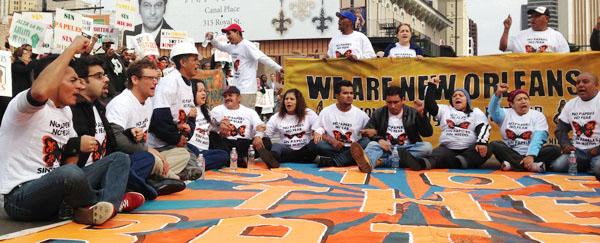Jimmy Barraza was unloading a car full of groceries with his wife outside of their Metairie apartment. When he turned around, he saw “about seven” guns pointed in their direction.
Barraza, a 29-year-old Honduran immigrant worker, said he is one of the many people within the immigrant community that have been randomly targeted by Immigration and Customs Enforcement agents in the New Orleans area.
In a December report, the New Orleans Workers’ Center for Racial Justice shed light on what they perceived to be race-based, stop-and-frisk raids conducted by Immigration and Customs Enforcement field officers – raids that go against the agency’s Criminal Alien Removal Initiative aimed at primarily targeting immigrants that are in the U.S. illegaly.
Although the agency’s representative Bryan Cox said that agents don’t go out randomly deporting people, Jacinta Gonzalez, a lead organizer at the center, said over the past year agents have been raiding grocery stores, bible study groups and work sites and randomly handcuffing people based on their appearance.
“They’re knocking on doors and handcuffing people in the street. They’re fingerprinting them and if anything comes up in the database, they immediately take them into custody,” Gonzalez said.
On Aug. 16, the day Barraza and his wife were approached, Barraza’s 16-year-old stepson and U.S. citizen, Carlos Sandoval, was pushed against a wall and handcuffed after coming outside to translate for his parents.
Sandoval and Barraza’s wife were eventually released from their handcuffs, and Barraza was taken away to a detention center because of his illegal status. He was later released and granted a six-month order of supervision, but he said the incident had a negative effect on Sandoval, who wasn’t expecting to be handcuffed due to his U.S. citizenship.
“After the incident, Carlos did a school project questioning the United States’ justice system,” Barraza said. “He wanted to know why it was okay for them to approach and handcuff random people, let alone a U.S. citizen. I don’t think he believes this is a just country anymore.”
Charles Corprew, an assistant professor of psychology at Loyola, said anxiety, possible depression and lowered self-esteem are just a few of the negative psychological effects that go along with the stop-and-frisk method.
He said that he sees similarities between what’s occurring here and the recently reformed stop-and-frisk policing tactic that targeted black and Latino men in New York City.
According to the Department of Homeland Security, in 2012 nearly 87 percent of the 643,474 immigration enforcement apprehensions in the U.S. were male and about 47 percent were between the ages of 18 and 29.
“I would say that the demographic of, you know, teens and men in their mid to late 20s has been the targeted group, particularly with stop-and-frisk in various spaces around the country,” Corprew said. “So, it is very similar in that demographic. I think maybe that is the perception of where the threat comes from.”
Loyola Law Professor M. Isabel Medina said that immigration reform is proving to be a challenging area for a nation that was founded and shaped by immigrants.
“The issue of race transcends the issue of immigration, it seems,” Medina said. “Politically, I don’t know what’s going to happen. It sounds like it’s pretty dead in the water waiting for reform, which is a shame.”
Today, Barraza is an active member in the New Orleans Workers’ Center of Racial Justice and he’s organizing with other community members to learn more about the injustices the immigrant community has dealt with and the rights that immigrants have in this country.
“I always tell my friends, family and anyone who shares the same experiences that I’ve had with ICE agents to join the organization and learn about their rights,” Barraza said. “At the end of the day, we’re human beings, and I don’t think a lot of people realize that.”
Nia Porter can be reached at naporter@loyno.edu









